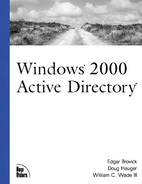Windows 2000 Management Services
The services available with Windows 2000 to provide desktop management are comprehensive enough to provide a level of desktop management that reduces cost and increases efficiency.
Event Notification
Windows 2000, as a management solution, reports on events recorded in the event log. Applications can detect which events are occurring and can take the appropriate action. The event log, which is viewed with the Microsoft event viewer, is the central location for logged events. This gives the administrator a single place to monitor for errors or other reported events.
COM and DCOM
One of the many uses of the COM and DCOM platforms is that object-oriented applications can be developed to support enterprise management services. COM is a collection of objects that exist on multiple servers and that can be used by distributed applications. Although COM enables applications on a server to share objects, DCOM is an extension that supports communications among those objects across multiple servers on a LAN, WAN, or even the Internet.
Windows Management Instrumentation (WMI)
WMI provides an interface for which standard management data from any source can be gathered and analyzed. Likewise, through the Windows Driver Model (WDM) extension for WMI, standard hardware management data can be gathered and analyzed by management applications. This gathered data can be used by applications, such as System Management Servers (SMS), to work closely with the desktop.
Active Directory
A distributed, secure, multi-master directory service is the subject of this book. Active Directory provides two key management services:
A standardized locator service, Lightweight Directory Access Protocol (LDAP) 3.0, provides a standard way to locate resources within the enterprise.
A group policy system that enables user and computer policies to be applied across the directory. This is key to the Windows 2000 change and configuration management strategy. After an application is installed on the desktop, policies can be defined as to how, and if, that application can be used.
By simplifying and automating application deployment and by managing the application after it has been deployed using Active Directory group policies, maintenance costs are reduced and user efficiency is increased, effecting an overall reduction in the cost of ownership.
Future Services
The next versions of the Windows server platform will provide additional management services. Management data will be replicated to various locations within the enterprise. Management system load balancing and scheduling will also be supported for various management applications and tasks.
